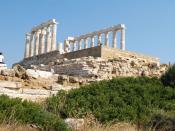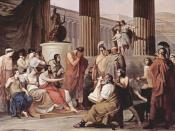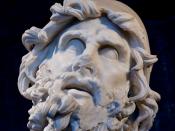Have you ever noticed how people tend to have some very
positive traits, but then they cancel them out with negative traits? This is a typical
aspect of human nature.Human nature is not perfect; it is a very intricate web of
traits, both positive and negative. This aspect of human nature is shown in both
The Odyssey by Homer,with Odysseus, and Into Thin Air, by John Krakauer, with
John. They are both intelligent men, they can make some very poor
decisions.
Odysseus is very intelligent. He uses his intelligence against
Polyphemus, and escapes from him. Odysseus first uses his
intelligence when he tells the Cyclops that his name is nobody:
" 'Nobody-- that's my name. Nobody-- so my mother and father call
me, and my friends'"(223, lines 410-411).When he gouges the
Cyclops's eye, the Cyclops tries to obtain aid from his friends and
screams out " 'Nobody, friends.
Nobody's killing me now by fraud and
not by force [brains, not braun]!' "(224, lines 453-454). His friends reply, " 'If you're
alone, and nobody is trying to overpower you now-- look, it must be a
plague sent here by mighty Zeus and there's no escape from that.' " (224,lines 455-
459). Odysseus managed to fool all of the Cyclops with his intelligence.
But only a short while after, his tendency to make poor decisions
comes into play.
Odysseus, showing his poor-decision-making trait, escapes the island and
than only a short distance from the shore, he foolishly taunts the Cyclops, and
almosts pays for his poor decision with his life: " ' So, Cyclops, no weak coward
it was whose crew you bent to devour there in your vaulted cave-- you with your
brute force! Your filthy crimes came down upon your own head, you shameless
cannibal, daring...


